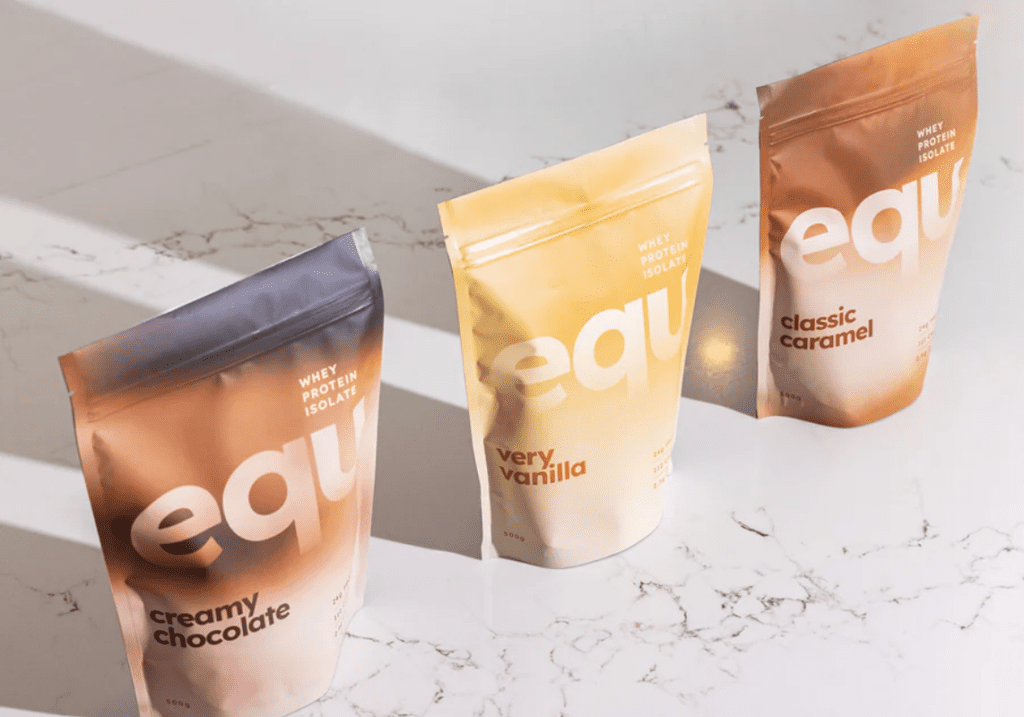But what about protein powder? Is it a healthy supplement to include in your diet? This article aims to delve into the benefits of protein powder, helping you make an informed decision.
Explore whether protein powder is the right choice for you by understanding its sources, benefits, drawbacks, and how to incorporate it wisely into your diet.
Ready to shake things up? Let’s dive in!
To start off, let’s address the concern of mixing protein powders effectively. Using our tried and tested equ 400ml Shaker, with its secure screw-on lid and snap closure, ensures a hassle-free experience. This BPA-free shaker is designed for pouring and mixing powdered drinks and supplements, making it an invaluable accessory for those incorporating protein powder into their routine.
Now that we have the mixing part sorted, let’s explore the various aspects of protein powder consumption. Whether you are looking to achieve specific intake goals or seeking a meal plan tailored to your needs, it’s essential to understand how protein powder fits into your overall nutrition strategy.
One of the key areas where protein powder excels is in supporting athletic performance. In fact, when combined with appropriate training strategies, protein intake can significantly impact muscle growth and recovery. To better comprehend this relationship between protein and training, it’s crucial to understand how nutrition fuels your physical performance.
So, whether you are an athlete striving for peak performance or an individual seeking to enhance your overall well-being, this article will provide insights into the benefits and potential risks of protein powder. Armed with this knowledge, you can make an informed decision about incorporating protein powder wisely into your diet.
Table of Contents
Understanding Protein Powder
Protein powder is a popular dietary supplement designed to help individuals meet their daily protein requirements. It is typically derived from various sources, both animal-based and plant-based, to accommodate diverse dietary preferences and nutritional needs.
Definition and Explanation
Protein powders are concentrated sources of protein that come in various forms such as powders, shakes, and bars. These supplements are particularly beneficial for those who may struggle to get enough protein through whole foods alone. They play a crucial role in supporting muscle growth, recovery after exercise, weight management, and overall health.
Different Sources of Protein Powder
Protein powders can be categorised into two main types based on their sources:
- Animal-Based Protein Powders:
- Whey Protein: Derived from cow’s milk, whey protein contains all essential amino acids and is rich in leucine, which is vital for muscle protein synthesis. Whey protein is known for its high digestibility and rapid absorption.
- Casein Protein: Also sourced from milk, casein releases amino acids more slowly compared to whey, making it ideal for prolonged periods without food intake, such as overnight.
- Egg Protein: Made from egg whites, this type of protein powder offers a high-quality protein source without the fat found in egg yolks.
- Collagen Protein: Extracted from animal tissues like skin and bones, collagen protein supports joint health and skin elasticity.
- Plant-Based Protein Powders:
- Pea Protein: A popular choice among vegans and individuals with dairy allergies, pea protein provides a good balance of essential amino acids.
- Hemp Protein: Contains omega-3 fatty acids and fibre, making it beneficial for digestive health.
- Pumpkin Seed Protein: Rich in magnesium and zinc, this type is another excellent option for those avoiding dairy.
- Soy Protein: Offers a complete amino acid profile similar to animal proteins.
- Algae Protein: Emerging as a sustainable alternative with a high nutritional value.
Choosing the right type of protein powder depends on individual dietary restrictions, health goals, and personal preferences. Ensuring you select a high-quality product, such as those offered by Equ Foods, is essential for reaping the benefits while minimising risks.
Incorporating these supplements wisely into your diet can provide an efficient way to ensure adequate protein intake tailored to your specific lifestyle and goals.
Pros of Including Protein Powder in Your Diet

Role of Protein Powder in Supporting Weight Management Goals
Protein powder benefits those aiming to manage their weight. High-protein diets can increase feelings of fullness and satiety, potentially reducing overall caloric intake. Protein shakes or smoothies can serve as convenient, nutrient-dense meal replacements or snacks, helping to control hunger and support healthy weight loss or maintenance.
A study reviewed in 2020 found that participants who consumed protein-enriched meals reported higher levels of fullness and reduced food cravings, aiding in weight management efforts. [1]
Muscle-Building and Recovery Benefits of Protein Powder
Athletes and fitness enthusiasts often turn to protein powder to enhance muscle growth and accelerate recovery post-exercise. Whey protein, for instance, is rich in branched-chain amino acids (BCAAs) like leucine, which play a crucial role in muscle protein synthesis.
1. Muscle Growth
Regular consumption of protein powder after resistance training can lead to significant increases in muscle mass and strength.
2. Recovery
Protein powders help repair muscle tissues damaged during intense workouts, reducing muscle soreness and improving recovery times.
A 2018 review highlighted that individuals consuming whey protein experienced better muscle growth compared to those who did not supplement with it. [2]
Importance of Adequate Protein Intake for Elderly Individuals
Adequate protein intake is essential for maintaining muscle mass, strength, and overall health among the elderly. As people age, they naturally experience a decline in muscle mass and function, known as sarcopenia. This condition increases the risk of falls and fractures.
Benefits for the Elderly:
- Prevention of Muscle Loss: Adding protein powder to the diet can help elderly individuals meet their daily protein requirements more easily.
- Enhanced Nutritional Profile: Protein supplements can provide a balanced mix of nutrients that support bone health and immune function.
Incorporating these benefits into your routine can make protein powder a valuable addition to your diet. To make an informed decision about the brand you choose, it’s worth considering the influence of brands like equ in the industry.
Cons and Considerations: Potential Risks of Using Protein Powder
Risks Associated with Excessive or Improper Consumption
Using protein powder supplements excessively can also lead to health complications. While adequate protein intake is essential, too much of it can stress the kidneys, create an acidic environment in the body, and potentially lead to:
- Bone health issues
- Liver problems
- Digestive discomforts like constipation and bloating
Balancing your diet to avoid replacing whole foods with supplements is crucial. Excessive reliance on protein powders might reduce your carbohydrate intake, leading to lethargy and lack of focus.
To mitigate these risks and ensure safe consumption of protein powder, several factors should be considered:
- Choice of Quality Products: Opt for high quality protein options, like Whey Protein Isolate with minimal additives or fillers.
- Proper Dosage: Avoid excessive consumption and follow recommended serving sizes.
- Diversify Your Protein Sources: Don’t rely solely on protein powders; incorporate a variety of whole foods rich in protein into your diet.
- Personalised Dietary Planning: For more insights on personalised dietary plans that suit your specific needs, including protein intake goals, you can refer to equ, who provide tailored meal plans to meet your dietary objectives.
By adhering to these considerations, you can make informed decisions about incorporating protein powder into your diet safely. Remember, moderation and a well-rounded approach are key to enjoying the benefits of protein powder while minimising its potential drawbacks.
Making Informed Choices: Selecting the Right Protein Powder for You
Choosing the right protein powder can be overwhelming with so many options available. But when you have all the information you need, you can confidently choose a protein powder that is safe and of high quality.
Factors to Consider When Choosing a High-Quality Protein Powder
Choose between animal-based or plant-based protein powders based on your dietary preferences, allergies, and ethical beliefs. Some common animal-based options are whey, casein, and collagen, while plant-based alternatives include pea, hemp, soy, and rice proteins.
Key Ingredients to Avoid in Protein Powders
- Artificial Sweeteners
- Ingredients like aspartame, sucralose, and saccharin are often added to protein powders to make them taste better, but they can have negative effects on your health.
- Instead, go for natural sweeteners such as, thaumatin, stevia or monk fruit which provide sweetness without any harmful side effects.
- Sugar Alcohols
- Sugar alcohols like sorbitol, xylitol, and erythritol can cause digestive problems like bloating and diarrhea.
- Check the labels of protein powders to see if they avoid using these additives or only use them in small amounts.
- Fillers and Additives
- Some protein powders contain unnecessary fillers like maltodextrin that don’t provide any nutritional value.
- It’s better to choose products with a simple ingredient list that focuses on pure protein sources.
Always read labels thoroughly to avoid artificial sweeteners and sugar alcohols that could hinder your health goals.
For those seeking guidance on integrating high-quality protein powders into their diet effectively, consider exploring resources like equ’s Protein for Health blog or their range of curated products. These platforms offer valuable insights into making nutrition choices that align with your fitness objectives.
Additionally, if you’re interested in some delicious recipes incorporating protein powders, you can check out equ’s recipe blog for inspiration.
Understanding these factors helps you make choices that support your health without unwanted risks.
Incorporating Protein Powder Wisely into Your Diet
Recommended Daily Protein Intake for Adults
Achieving the right balance of protein in your diet starts with understanding the recommended daily intake. According to dietary guidelines, the average adult woman should aim for approximately 46 grams of protein per day, while the average adult man should target around 56 grams.
However, these numbers can vary based on factors such as:
- Age
- Activity level
- Muscle mass
- Overall health
For example, highly active individuals or those involved in intense strength training might require a higher protein intake to support muscle recovery and growth.
Best Practices for Incorporating Protein Powder
Integrating protein powder into your diet can be straightforward and versatile. Here are some optimal usage guidelines to help you make the most out of your protein supplement:
- Smoothies and Shakes:
- Blend protein powder with fruits, vegetables, and a base liquid (water, milk, or plant-based milk) for a nutritious and balanced meal replacement or post-workout recovery drink.
- Baking:
- Enhance the protein content of baked goods by adding a scoop of protein powder to recipes like pancakes, muffins, or energy bars.
- Yogurt and Porrige:
- Mix protein powder into yoghurt or oats for a quick and easy protein boost during breakfast or as a snack.
- Hydration Considerations:
- Ensure adequate fluid intake when consuming protein powder to aid digestion and prevent potential dehydration.
- Timing:
- Consume protein powder strategically around workouts – pre-workout to fuel muscles or post-workout to aid in recovery.
Additional Resources
For those looking for high-quality options, consider exploring protein products that are free from artificial sweeteners and additives. Also, having access to resources like Your Pocket Nutrition Coach can provide personalised guidance tailored to your dietary needs.
Approaching your diet with these strategies ensures that you’re not just meeting but optimising your daily protein intake effectively.
Balanced Approach: Comparing the Benefits of Whole Foods and Protein Powders

Advantages of Whole Foods vs. Protein Powders
Whole Foods:
- Nutrient-Dense: Whole foods such as lean meats, dairy, beans, nuts, and seeds provide a wide range of essential nutrients beyond protein, including vitamins, minerals, fibre, and healthy fats.
- Natural Digestion: Whole foods are often easier for the body to digest and absorb compared to some processed protein powders.
- Satiety: Whole foods tend to be more filling due to their fibre content and complex structure, helping manage hunger effectively.
Protein Powders:
- Convenience: Ideal for busy individuals or those with limited time to prepare meals. A quick shake can provide protein on-the-go.
- Precision: Allows for precise control over protein intake, which can be particularly beneficial for athletes or those with specific dietary needs.
- Variety: Available in numerous forms (e.g., whey, soy, pea), catering to different dietary preferences and restrictions.
Complementing Each Other
Combining whole foods with protein powders can offer a balanced approach to meet nutritional needs:
- Post-Workout Recovery: A protein shake right after a workout can quickly supply amino acids to muscles. Following it up with a whole-food meal later ensures sustained nutrient intake.
- Meal Replacement: While not recommended as a frequent substitute, a high-quality protein powder mixed with fruits and vegetables can serve as an occasional meal replacement when time is tight.
Nutrient-Rich Alternatives to Protein Powder
For those who prefer obtaining protein from whole foods rather than supplements:
- Lean Meats: Chicken breast, turkey, fish
- Dairy Products: Greek yoghurt, cottage cheese
- Legumes: Lentils, chickpeas, black beans
- Nuts & Seeds: Almonds, chia seeds, pumpkin seeds
- Grains: Quinoa, buckwheat
These alternatives not only provide high-quality protein but also support overall health through their additional nutrient profiles.
Explore personalised nutrition programmes that incorporate both whole foods and supplements for a holistic approach to health.
By understanding the strengths of both whole foods and protein powders, you can make informed choices that align with your health goals.
Final Thoughts
Consulting with a nutrition professional is a wise step before making significant changes to your diet or supplement routine. They can provide personalised recommendations tailored to your specific health needs and goals, ensuring you make the best choices for your well-being.
While protein powder can be a convenient and effective option for some, it should not replace whole foods as the main source of nutrition. Prioritising a balanced diet of whole, unprocessed foods is essential for long-term health and well-being. Protein powder can support your diet, but relying solely on it may lead to nutritional imbalances.
For those interested in exploring premium protein options, equ’s protein powder collection offers high-quality supplements made with real ingredients.
Ultimately, incorporating both whole food sources and protein powders wisely can help you achieve your nutritional goals effectively.
A holistic approach to nutrition supports optimal health and vitality, so make informed decisions that best suit your lifestyle and dietary needs.
F&Q’s
What is the importance of protein in a healthy diet?
Protein plays a crucial role in a healthy diet as it is essential for building and repairing tissues, making enzymes and hormones, and supporting overall immune function.
What are the different sources of protein powder?
Protein powder can be sourced from animal-based sources such as whey or casein, as well as plant-based sources like pea, hemp, or rice protein.
How does protein powder support weight management goals?
Protein powder can aid in weight management by promoting satiety, preserving lean muscle mass, and supporting a higher metabolism during weight loss.
What are the potential risks of using protein powder?
Potential risks of using protein powder include concerns over contaminants like heavy metals in low-quality products, as well as the risks associated with excessive or improper consumption of these supplements.
What is the recommended daily intake of protein for adults?
The recommended daily intake of protein for adults varies based on individual factors but generally falls around 0.8-1.0 grams per kilogram of body weight. Specific guidelines for women and men may also apply.
How do whole foods and protein powders compare in terms of benefits?
Whole foods and protein powders offer unique advantages that can complement each other. While whole foods provide essential nutrients and fiber, protein powders offer convenience and concentrated protein content.
Why is it important to consult with a nutrition professional before making changes to your diet or supplement routine?
Consulting with a nutritionist is crucial as they can provide personalised guidance based on individual health needs. While protein powder can be convenient, it should not be relied upon as the sole source of nutrition.

